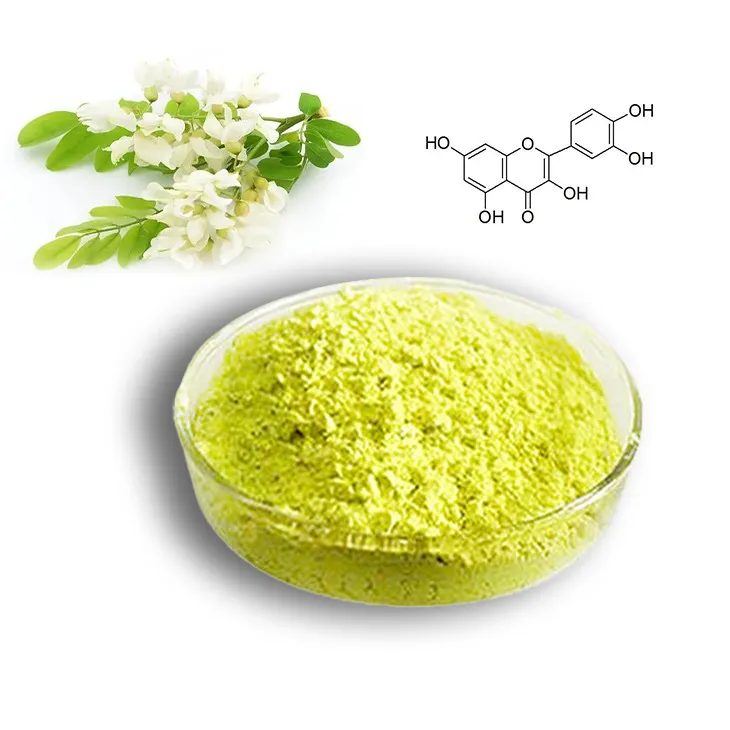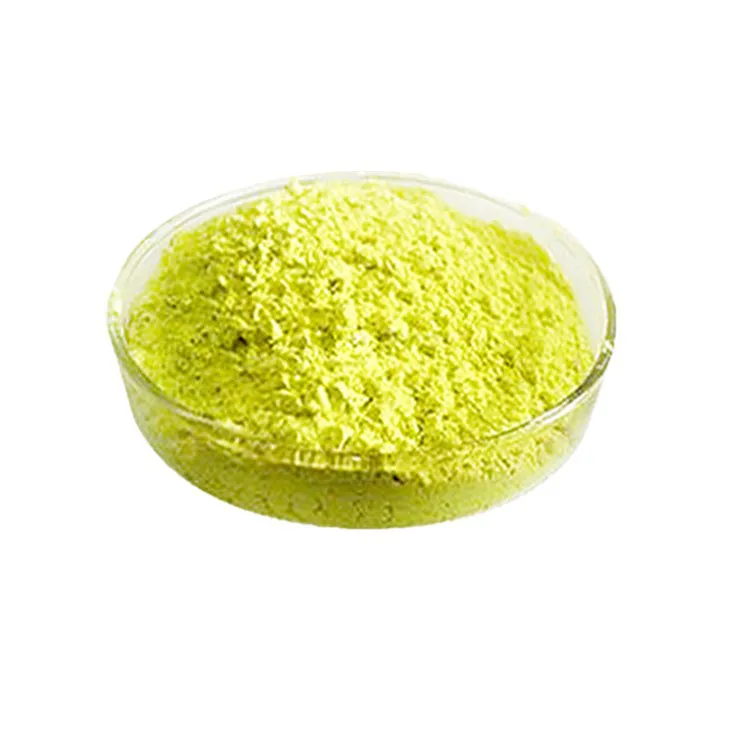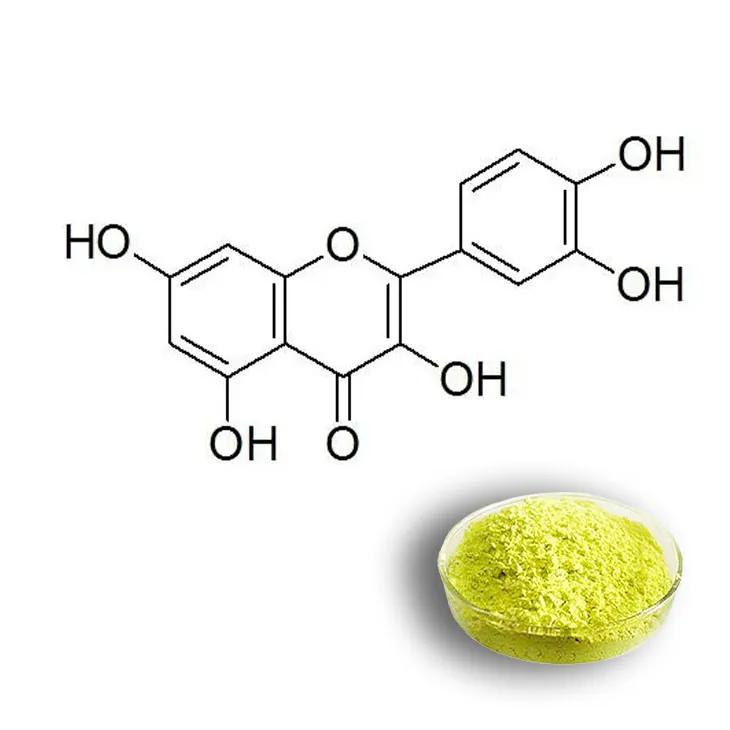- 0086-571-85302990
- sales@greenskybio.com
11 Reasons to Switch to Organic and Natural Quercetin.
2024-12-20

1. Enhanced Bioavailability
Organic and natural Quercetin often has enhanced bioavailability compared to its synthetic counterparts.
Bioavailability refers to the proportion of a substance that enters the circulation when introduced into the
body and is thus available to be utilized by the body's cells. In the case of Quercetin, its natural form is more
easily recognized and absorbed by the body's biological systems.
This is because natural Quercetin is typically accompanied by other co - factors and compounds that aid in its
absorption. For example, when obtained from natural sources like fruits and vegetables, quercetin may be
associated with dietary fibers and other phytonutrients. These substances can help to protect the quercetin
molecule during digestion and facilitate its passage through the intestinal wall and into the bloodstream.

2. Rich in Co - nutrients
One of the significant advantages of choosing organic and natural quercetin is that it comes rich in co -
nutrients. When quercetin is sourced from whole foods or is produced through organic and natural extraction
methods, it is not isolated but rather accompanied by a host of other beneficial substances.
For instance, in fruits such as apples and berries, quercetin is found along with vitamins like vitamin C. Vitamin
C not only has its own antioxidant properties but can also enhance the antioxidant activity of quercetin.
Additionally, there may be flavonoids and phenolic acids present in the natural source that work synergistically
with quercetin. This complex combination of nutrients provides a more comprehensive health - promoting effect
than quercetin alone.

3. Purity and Quality Assurance
Organic and natural quercetin products often come with a higher level of purity and quality assurance.
Organic certification standards require strict control over the production process, from the source of the raw
materials to the final product.
In the case of natural quercetin, producers are more likely to use high - quality plant sources and employ gentle
extraction methods to preserve the integrity of the quercetin molecule. This reduces the risk of contamination
with harmful substances such as pesticides, heavy metals, or chemical solvents that may be present in
non - organic or synthetically produced quercetin.

4. Support for Local and Sustainable Agriculture
Opting for organic and natural quercetin can contribute to support for local and sustainable agriculture.
Organic farming practices are designed to be environmentally friendly, promoting soil health, biodiversity,
and water conservation.
When consumers choose products made from organically - sourced quercetin, they are indirectly supporting the
farmers who use sustainable farming methods. These farmers often use techniques like crop rotation, composting,
and natural pest control, which are better for the long - term health of the land and the surrounding ecosystem.
This also helps to reduce the carbon footprint associated with agricultural production.

5. Less Chemical Processing
Organic and natural quercetin generally involves less chemical processing compared to synthetic forms.
Synthetic quercetin may be produced through a series of complex chemical reactions in a laboratory setting,
which often require the use of various chemical reagents and solvents.
In contrast, natural quercetin is typically extracted from plant sources using more natural and gentle methods
such as cold - pressing or water - based extraction. This not only reduces the potential exposure to harmful
chemicals but also helps to maintain the natural structure and properties of the quercetin molecule.
6. Allergy - Friendly
For some individuals, organic and natural quercetin may be more allergy - friendly. Synthetic quercetin
products may contain traces of chemicals or additives that could potentially trigger allergic reactions in
sensitive individuals.
Since organic and natural quercetin is sourced from plants and is processed with minimal additives, it is less
likely to cause allergic responses. However, it is still important for those with known plant - related allergies
to exercise caution and consult a healthcare provider before using any quercetin product.
7. Long - Term Health Benefits
The use of organic and natural quercetin may offer more long - term health benefits. Due to its natural
composition and the presence of co - nutrients, it can have a more profound and lasting impact on the body's
overall health.
For example, its antioxidant properties can help to protect cells from oxidative stress over time, reducing the
risk of chronic diseases such as heart disease, cancer, and neurodegenerative disorders. The synergistic effect
of the co - nutrients present in natural quercetin can also support the body's immune system, improve digestion,
and enhance skin health in the long run.
8. Compatibility with Natural Diets
Organic and natural quercetin is highly compatible with natural diets. For those following a diet rich in
whole foods, organic produce, and natural supplements, natural quercetin fits seamlessly into such a dietary
pattern.
It can be easily incorporated into a plant - based diet, for example, as it is found in many fruits, vegetables,
and herbs. This compatibility makes it a more natural choice for individuals who are striving to maintain a
holistic and natural approach to their diet and health.
9. Ethical Sourcing
Many producers of organic and natural quercetin emphasize ethical sourcing. This means that they ensure the
plants used for extraction are sourced in a way that respects the rights and livelihoods of local communities.
Ethical sourcing also involves fair trade practices, which guarantee that farmers receive a fair price for their
crops. By choosing organic and natural quercetin products, consumers can support these ethical business
practices and contribute to the well - being of communities around the world.
10. Potentially Lower Side Effects
There is evidence to suggest that organic and natural quercetin may have potentially lower side effects
compared to synthetic versions. Since it is more in line with the body's natural biochemistry, it is less likely
to disrupt normal physiological processes.
Synthetic quercetin, on the other hand, may be more difficult for the body to metabolize, which could lead to
potential side effects such as gastrointestinal discomfort or interference with the absorption of other
nutrients. However, more research is still needed to fully understand the differences in side - effect profiles
between the two forms.
11. Respecting Nature's Wisdom
Finally, choosing organic and natural quercetin is a way of respecting nature's wisdom. Nature has evolved
to produce quercetin in plants in a complex and balanced way, along with other co - factors and nutrients.
By opting for the natural form, we are following nature's lead and taking advantage of the complete package of
health - promoting substances that nature has provided. This approach also aligns with the growing awareness
of the importance of natural and holistic health solutions.
FAQ:
Question 1: What is quercetin?
Quercetin is a flavonoid, a type of natural compound found in many fruits, vegetables, and grains. It has antioxidant, anti - inflammatory, and other potential health - promoting properties.
Question 2: Why is the organic form of quercetin better?
The organic form of quercetin is often better because it is produced without the use of synthetic pesticides, fertilizers, and genetically modified organisms. This can lead to a purer product with fewer potential contaminants.
Question 3: How does natural quercetin enhance bioavailability?
Natural quercetin may be better absorbed by the body compared to synthetic forms. It often comes in a form that is more easily recognized and processed by the body's cells, which can lead to enhanced bioavailability.
Question 4: What are the environmental benefits of choosing organic quercetin?
Choosing organic quercetin supports sustainable farming practices. Organic farming reduces the use of harmful chemicals that can pollute the soil, water, and air. It also promotes biodiversity on farms.
Question 5: Is natural quercetin more effective for anti - inflammatory purposes?
There is evidence to suggest that natural quercetin may be more effective for anti - inflammatory purposes. Since it is in a form closer to what is found in nature, it may interact more effectively with the body's inflammatory pathways.
Question 6: Can organic quercetin help with antioxidant protection?
Yes, organic quercetin can help with antioxidant protection. Quercetin, in general, has antioxidant properties, and the organic form is no exception. It can help neutralize free radicals in the body, which can reduce oxidative stress.
Related literature
- The Health Benefits of Organic Quercetin: A Review"
- "Bioavailability of Natural vs. Synthetic Quercetin Compounds"
- "Environmental Impact of Organic Quercetin Production"
- ▶ Hesperidin
- ▶ citrus bioflavonoids
- ▶ plant extract
- ▶ lycopene
- ▶ Diosmin
- ▶ Grape seed extract
- ▶ Sea buckthorn Juice Powder
- ▶ Beetroot powder
- ▶ Hops Extract
- ▶ Artichoke Extract
- ▶ Reishi mushroom extract
- ▶ Astaxanthin
- ▶ Green Tea Extract
- ▶ Curcumin Extract
- ▶ Horse Chestnut Extract
- ▶ Other Problems
- ▶ Boswellia Serrata Extract
- ▶ Resveratrol Extract
- ▶ Marigold Extract
- ▶ Grape Leaf Extract
- ▶ blog3
- ▶ blog4
- ▶ blog5
-
Pure 85% Tomentil Extract.
2024-12-20
-
Rosemary extract
2024-12-20
-
American Ginseng Root Extract
2024-12-20
-
Citrus Aurantii Extract
2024-12-20
-
Tamarind extract powder
2024-12-20
-
Chasteberry Extract
2024-12-20
-
Nutmeg Extract
2024-12-20
-
Calendula Extract
2024-12-20
-
Stevia Extract
2024-12-20
-
Eyebright Extract
2024-12-20
-
Natural grape seed extract
2024-12-20





















